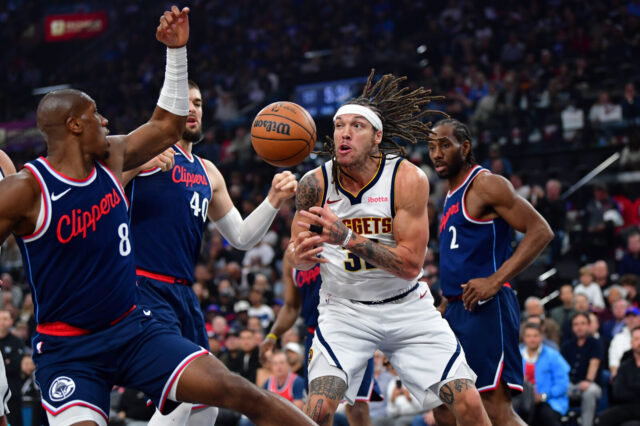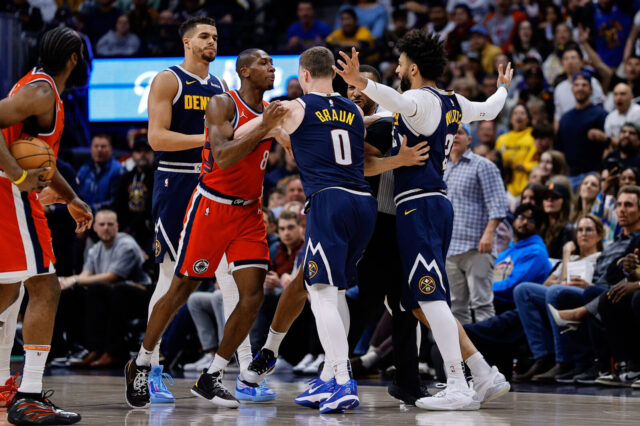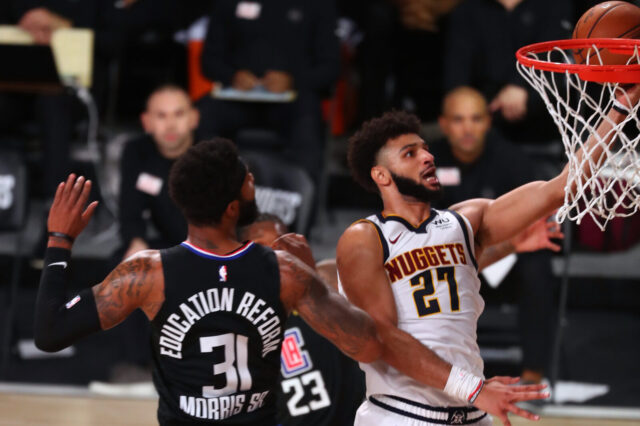There is no more beloved figure in Denver sports right now than Nikola Jokić.
The Denver Nuggets center, fresh off an MVP award last season, is bearing the burden of an entire franchise on his shoulders right now. No Jamal Murray, no Michael Porter Jr., and no P.J. Dozier set the tone for Jokić the moment he returned to the court against the Miami Heat at the beginning of Denver’s most recent seven-game road trip. The Nuggets, losers of six straight to that point, needed stability. They needed an anchor to center them for awhile, someone who could consistently make things easier for the rest of the team by simply being out there.
Since Jokić returned, the Nuggets are 4-3. In the 238 minutes with Joker ON the court, the Nuggets are plus-69 in the plus-minus department, averaging close to a 10-point advantage in Jokić’s minutes every single game.
In the other 103 minutes across these seven games, the Nuggets are minus-54, an average of an eight-point deficit. That is a ludicrous number, and it doesn’t even offer the full picture of Denver’s season to this point in which the minutes without the big fella have been a complete and utter disaster.
Let’s focus on the positives though: Jokić is out there a lot, which means the Nuggets have held serve in many of these games. How have they done it? Usually, it’s by giving the ball to Jokić. The MVP is maintained a 33.0% usage rate in the last seven games, up from a career high 31.3% usage rate on the season. Jokić is looking to score more and more aggressively as the season wears on, and it’s not hard to see why.
What the San Antonio Spurs did to Thaddeus Young on the above possession was just rude. Jokić had 33 points at the time, and he scored two more by backing Young into the post physically, just waiting for the help to come so he could dish an assist off to a teammate instead. Except, the Spurs never helped, and Jokić battered Young all the way down to the charge circle before turning base line for an easy jump hook.
On the next possession against Jonas Valanciunas, Jokić completed the pounding he had dished out by going to the paint once again, waiting for a double to come and never seeing one, scoring easily easily over big JV to effectively ice the game against the New Orleans Pelicans.
In the Spurs game, Jokić finished with 35 points, 17 rebounds, and 8 assists. In the Pelicans game, he finished with 39 points, 11 rebounds, and 11 assists. Those are absurd stat lines, and they show a certain reliance on production that can both and blessing and a curse. On one hand, it’s awesome to have a player capable of doing that, someone that can help turn around a six-game losing streak by himself. On the other hand, that dependability can be a little scary. What happens if Jokić were to miss any amount of games for any reason? What happens if he’s merely “good” rather than consistently great?
Jokić’s worst games this season, according to Game Score on Basketball Reference, were two losses on this trip and a blowout win over the Dallas Mavericks back in October. That game, Jokić had 11 points, 16 rebounds, and 8 assists, only shooting the ball nine times and accumulating just one turnover, instead focusing on the defensive end of the floor and helping hold Dallas to a mere 75 points. The other two losses were more emblematic of Denver’s issue though: Jokić had 18 points, 15 rebounds, and 7 assists in one game and 17 points, 15 rebounds, and 12 assists in the other. He had a positive plus-minus in both games. The problem was that the positives weren’t positive enough, and Jokić’s bad shooting efficiency in each game (36.8% and 35.3% from the field) were underwhelming. That was enough to sink the Nuggets.
The other aspect of Jokić’s game that struggled in each of those two losses specifically was his defense. The pick and roll duos of Cole Anthony – Wendell Carter Jr. as well as Zach LaVine – Nikola Vucevic were very effective against Jokić specifically. He didn’t have the quickness to match pace with the guard in combination with the recovery time needed to close out to the big man, and it’s one of the only reasons the Nuggets starters struggled in those games specifically.
Against the Magic, it was Cole Anthony late who hurt the Nuggets, finding soft spots in their man defense in the mid-range area. His ability to navigate screens and hit tough shots reminded me of Chris Paul in the playoffs last year, and that problem certainly hasn’t gone away.
Against the Bulls and Vucevic, Jokić was caught in no man’s land too many times, trying to balance the act of helping against LaVine (and Lonzo Ball) and recovering back to Vooch. He just wasn’t able to contest well on the perimeter, and both LaVine and Vooch hit some important shots with Jokić challenging late.
In both instances, Jokić’s foot speed has impacted him in a negative way. At the beginning of this year, Jokić was making those closeouts with regularity, running three-point shooters off the line and sticking with guards better than he ever has. Lately though, in the face of additional responsibility on the offensive end, it appears that Jokić has had to shift more of his energy to battering defenders and threading passes to cutters on the offensive end instead. He has taken a (small) step back defensively as the year has gone along, and it has led to better opportunities for the opposition.
And that’s okay.
No, seriously. That’s okay.
The regular season is long. Nearly two months of the season have already elapsed and we aren’t even a third of the way through Denver’s games yet. There are a full four months left until the regular season ends, and though the All-Star break bisects that long stretch, the pace doesn’t get much easier. Denver’s entire December is a struggle, with another four combined games against the Brooklyn Nets, Phoenix Suns, and Golden State Warriors. After that though, Denver has a significant reprieve in January in terms of competition (eight out of 15 games against teams .500 or below) as well as venue (six game home stand). When January hits, Denver can really start trying to make tangible progress in the standings.
Until then, they have to rely on Jokić. With Denver as shorthanded as they are on offensive firepower, the best way to create good shots consistently is giving the ball to their best player. Jokić has delivered when called upon, shooting 53% from the field in the fourth quarter, posing greater than a 3:1 assist-to-turnover ratio, and having more combined steals and blocks than turnovers. He’s been rock solid, and the more the Nuggets go through him (and play off of him by running, passing, and cutting) then the wins will continue to happen. It doesn’t matter that the Nuggets are shorthanded because they started the season with a deep roster, and the players they do have fit with Jokić very well.
This content is no longer available.
But here’s the crux of it: Jokić has to be selfish. He has to be at his apex level on the offensive end, and sometimes, that means taking more shots, making more plays for himself, and looking off teammates on occasion. Teams know that if they double Jokić, he’s wired to make the right play every single time. That works while the rest of the team is making shots, and the Nuggets shot 39.9% from three on their road trip. That’s pretty damn good. Jokić being unselfish stops working when the shooting dries up though, and there were clear instances of that on the trip as well. Denver shot 29.4% from three against the Magic and lost. They shot 34.4% against the Bulls and lost. They shot 28.1% from three against the Pels, and the only reason they won was because Jokić scored a bazillion points down the stretch as the Nuggets kept force-feeding him looks to score. Jokić has to be willing to take over, because if he’s not scoring, the Nuggets generally aren’t winning.
The Nuggets are 3-6 when Jokić scores fewer than 25 points. Last year, they were 23-11, mostly because Jokić could dish the ball to Jamal Murray and Michael Porter Jr. for much of the season and watch them take over at times. That gave Jokić opportunities to rest up, focus on distributing to teammates, and be an unselfish MVP. He doesn’t have that luxury this year, and fully appreciating that will help Denver get through the season until (and even when) Murray returns.
The selfish version of Jokić is the one that dominates the ball, that can’t be stopped in the paint, and dictates what the defense is going to do before anything happens. It doesn’t mean he never passes though. It means he holds the ball a little longer, drawing the defense a little closer, and letting his teammates cut and move hard before finally delivering a pass or taking the tough but necessary shot.
When Jokić doesn’t touch the ball on a possession, it often ends in a self-created opportunity by Monte Morris, Will Barton, or Aaron Gordon. In the right scenario, those can be helpful, and Jokić deserves to take a play off every now and then. Too often though, a string of those possessions in a row will lead to misses on one end and transition baskets on the other. The shot quality is often too low, devolving into fadeaways, step back jumpers, and leaning shots around the rim with no offensive rebounder near the basket. That’s when Jokić offenses struggle the most, and it’s why Jokić touches the ball as often as he does.
Teammates are going to have to cover for him on defense a little. They’ll have to expect fewer opportunities force fed to them to try and get “non-Jokić offense” going. They’re going to have to be okay with Jokić getting the glory, and I’m sure that can be frustrating at times, being described as Jokić and the Nuggets rather than just the Denver Nuggets. Jokić has averaged the most touches per game in the NBA for four straight years, and from the outside, playing Jokić ball all the time can seem like an insane commitment to screening, cutting, spotting up, and waiting for Jokić to read the floor to pass the ball to the right guy. If the right guy isn’t “player X” for several games in a row, then “player X” might not necessarily be super happy about the way things are going.
For many other superstars, I have no doubt it would become grating on their teammates to a degree. For Jokić’s teammates, I hope by now he’s earned enough credit in the locker room to take on that responsibility without anyone else feeling like he’s stepping on their toes. Jokić has always been the vision of unselfishness as a superstar from the outside. His willingness to make the extra pass and try to move the ball as often as he does are traits that a normal scoring superstar like James Harden or Jayson Tatum might not gain favor for.
And the hope is, it’s only for a few more weeks. If Murray returns to form, the focus will shift entirely toward getting Murray acclimated, and rightfully so. Once Denver gets back their second star, everyone can and should be compartmentalizing their individual feelings to help Murray on his path to recovery. That means Jokić will be playing some more two-man game with his best partner, and if that goes well, the Nuggets will be winning a bunch of games in the process.
Until then, stay the course and trust in Jokić. That’s how the team is built, and that’s the best way for them to win games. Lots of post ups, lots of middle pick and roll, and lots of spacing and cutting around the big Serbian center. If Denver can survive for the next few weeks, they will be in great position to capitalize when the next opportunity comes.


